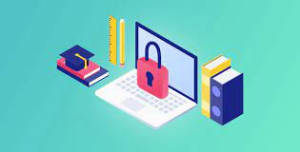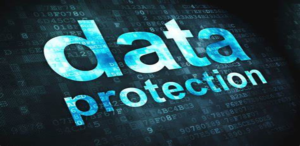
Protection of Student's Data from Misuse through Online Learning Platforms.

Student information alludes to data or records connected with individual student that are gathered, put away, and handled inside an instructive setting. It typically consists of personal, academic, and demographic data gathered by educational establishments, online learning platforms, or other providers of educational services.
Personal Information: This includes a student’s name, birth date, address, and other identifying details.
Academic Transcripts: Academic data like grades, transcripts, attendance records, test scores, and course enrollment history are frequently included in student data. This information helps track an student’s advancement and scholarly execution.
Information on Demographics: Demographic information about students can also include things like gender, ethnicity, preferred languages, socioeconomic status, and special educational needs. This data is helpful for dissecting instructive results and tending to value issues.
Conduct and Communications Information: Students’ interactions with online educational resources, such as their browsing patterns, responses to tests or quizzes, or time spent on particular activities, may be tracked by some learning platforms. Adaptive instruction, personalized learning, and educational research can all benefit from this data.
Records of communications: Student data may contain messages exchanged via email, chat logs, or discussion forums, or other forms of communication between educational establishments and students.
Permissions and Consents: Student data may also include records of consent and permission to collect, use, and share data obtained from students or their parents or guardians.

MISUSE OF STUDENT DATA BY ONLINE LEARNING PLATFORMS:
Online learning platforms can misuse student data in a variety of ways.
Assuming the safety efforts of an internet learning stage are insufficient, noxious entertainers might acquire unapproved admittance to understudy information. This can lead to data breaches in which personal information like names, addresses, and contact information is exposed and could be used to commit identity theft, commit fraud, or market to specific audiences.
Without obtaining consent or ensuring adequate data protection, online learning platforms may share student data with advertisers or third-party service providers. This can prompt the abuse of student information for designated promoting, profiling, or other business purposes.
Student information gathered by internet learning stages, for example, execution records, appraisals, or ways of behaving, can be connected to people without appropriate anonymization. Students may be identified as a result, and their data may be used for discriminatory, tracking, or profiling purposes.
Online learning platforms should securely erase or anonymize student data when it is no longer required for educational purposes. However, if proper data deletion procedures are not in place, there is a possibility that data will be retained for a longer period of time than is required or will be accessible to parties who are not authorized.
It’s possible that online learning platforms won’t make it clear how their data is used, who has access to it, or how it is collected. It is difficult for students and their parents to understand how their data is handled and to make educated decisions regarding their privacy as a result of this lack of transparency.
Online learning platforms can use student data for profiling, targeted marketing, and behavior tracking. Students’ preferences, choices, and experiences may be manipulated in this way without their knowledge or consent. Student data may be vulnerable to hacking, data breaches, and other cyberthreats if online learning platforms lack robust security measures. Students’ personal information and sensitive data could be misused or accessed by unauthorized parties as a result of this.

LAW ADHERING STUDENT DATA PROTECTION:
In various jurisdictions, several laws and acts have been enacted to safeguard student data.
Family Educational Rights and Privacy Act (FERPA): United States: FERPA is a government regulation that safeguards the protection of student training records in instructive establishments that get bureaucratic subsidizing. It provides guidelines for the proper handling and release of education records and gives parents and eligible students (those over 18) the right to control the disclosure of those records.
Children’s Online Privacy Protection Act (COPPA): United States: Children’s online privacy is protected by the federal law known as COPPA. It requires websites and online services that collect personal information from children to obtain parental consent and provide clear privacy policies, among other things.
The National Education Policy (NEP) 2020: India: The NEP, which is not a law, lays out the vision and policy framework for India’s education system. It accentuates the need to guarantee the protection and security of student information. The National Education Policy (NEP) encourages educational institutions to implement appropriate technology and security measures to safeguard student information and calls for the establishment of robust data protection policies and practices.
General Data Protection Regulation (GDPR) – European Union: The General Data Protection Regulation (GDPR) is a comprehensive data protection policy that applies to all European Union member states. It establishes principles for data collection, processing, storage, and consent, and includes provisions for the protection of personal data, including student data. Individuals are given certain rights over their personal data, and businesses are required to put in place appropriate security measures.
Personal Information Protection and Electronic Documents Act (PIPEDA): Canada: In Canada, PIPEDA is a federal law that governs private organizations’ collection, use, and disclosure of personal information. It establishes guidelines for consent, data retention, security measures, individual access to personal information, and provides privacy protections for student data.
Data Protection Act 2018: United Kingdom: The primary piece of data protection legislation in the UK is the Data Protection Act 2018. It adds new regulations for the processing of personal data, including student data, to the GDPR. It frames information security standards, privileges of people, and commitments of associations taking care of individual data.
Personal Data Protection Act (PDPA): Singapore: The PDPA is an exhaustive information security regulation in Singapore that oversees the assortment, use, and exposure of individual information, including student information. It establishes guidelines for data breaches, data access and correction rights, consent requirements, and data protection obligations for organizations.
To protect student data, educational institutions and online learning platforms frequently have their own policies and procedures in place. To guarantee the privacy and security of student data, educational stakeholders must be aware of and adhere to all applicable laws and regulations.

MEASURES TO BE USED BY ONLINE PLATFORM TO PROTECT DATA:
Internet learning stages ought to utilize hearty information safety efforts to shield understudy information from unapproved access, information breaks, or cyberattacks. Data encryption, safe transmission protocols, strong user authentication, and routine security audits are all examples of this.
Stages ought to have clear and complete protection approaches that frame how student information is gathered, utilized, put away, and shared. These arrangements ought to be effectively open and written in clear and reasonable language. Particularly when collecting sensitive data, platforms ought to obtain appropriate consent from students or their parents or legal guardians.
Student information ought to be put away safely in consistence with material information security regulations and guidelines. Data should be stored securely on servers with restricted access and appropriate backup and disaster recovery procedures, according to platforms. Information maintenance arrangements ought to be plainly characterized, and information ought to be safely erased when at this point not required.
Data protection and privacy best practices should be taught to platform providers, educators, and educational institutions. They will have a better understanding of their responsibilities for handling student data as a result of this, lowering the likelihood of data misuse.
Data protection laws and regulations, like the General Data Protection Regulation (GDPR) in the European Union and the Family Educational Rights and Privacy Act (FERPA) in the United States, should be followed by platforms. They should also check and update their policies and procedures on a regular basis to make sure they keep up with the changing requirements of the regulatory bodies.
CONCLUSION:
Student data is frequently used by educational establishments to make educated decisions regarding the curriculum, teaching methods, and student support. Protecting student data ensures the integrity and quality of educational analysis and planning data, which is essential for effective decision-making.
Protecting students’ rights and privacy is an ethical obligation for educational platforms and institutions. In order to provide a secure and inclusive learning environment in which students’ personal information is treated with care and respect, it is essential to respect student data privacy.
Online learning platforms and educational institutions can protect student data, ensure privacy, build trust, comply with legal requirements, prevent misuse, and maintain data security by prioritizing its protection. It eventually adds to establishing a protected and strong instructive climate for students.
In India, educational establishments, online learning platforms, and other entities that handle student data need to keep up with these laws and regulations, put in place appropriate data protection measures, and place a high priority on the privacy and security of student information.







